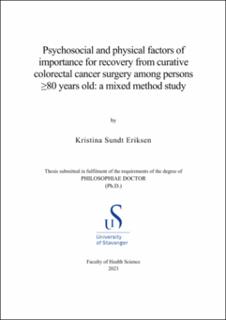Psychosocial and physical factors of importance for recovery from curative colorectal cancer surgery among persons ≥80 years old: a mixed method study
Doctoral thesis
Permanent lenke
https://hdl.handle.net/11250/3084856Utgivelsesdato
2023-06Metadata
Vis full innførselSamlinger
- PhD theses (HV) [52]
Originalversjon
Psychosocial and physical factors of importance for recovery from curative colorectal cancer surgery among persons ≥80 years old: a mixed method study by Kristina Sundt Eriksen, Stavanger : University of Stavanger, 2023 (PhD thesis UiS, no. 706)Sammendrag
Background: Colorectal cancer is the third most common cancer worldwide. Colorectal cancer can be a fatal disease accompanied by suffering if untreated. Surgery is the mainstay for cure and is considered safe for patients of all ages. The median age of diagnosis is approximately 72 years in Norway. With the increase in the older population, it is likely that there will be an equivalent rise in the incidence of colorectal cancer. However, older persons represent a heterogeneous group of patients ranging from patients in good health to patients with increased vulnerability to treatment and complications.
An excessive 1-year post-operative mortality rate has been observed among patients aged ≥80 years compared to their younger counterparts. After a year, the 5-year survival rate equals that of younger patients. With improvements in diagnosis and treatment in recent years, more patients are living beyond cancer treatment and into recovery. However, for patients aged ≥80 years in Norway, follow-up is determined in dividually outside systematic follow-up programs. Hence, there is limited knowledge on patients’ experiences and perceptions regarding recovery after discharge.
Objectives: The overall aim of this study was to investigate the psychosocial and physical factors that are important for recovery after curative colorectal cancer surgery among persons aged ≥80 years. The following aims were formulated for the different studies:
• To explore the experiences of individuals aged ≥80 years recovering from surgery for colorectal cancer and the challenges they may encounter after discharge from hospital
• To explore the associations between sense of coherence, perceived social support, and demographic and clinical characteristics among survivors ≥ 80 years treated for curable colorectal cancer.
• To explore the experience of persons ≥80 years of age during recovery up to two years after curative colorectal cancer surgery
Methods: This project utilized a multiphase mixed method design, with the studies being conducted sequentially in their respective phases. Qualitative and quantitative methods were applied separately in the different phases and comprised the following: 1) qualitative interviews of colorectal cancer patients ≥80 years old (n=10) newly discharged from the hospital after surgery, 2) a quantitative cross-sectional survey of persons ≥80 years (n=56) treated for colorectal cancer 1 to 5 years prior and 3) qualitative interviews of persons ≥80 years old (n=18) treated for curative colorectal cancer 1 to 2 years prior.
Results: Recovery from colorectal cancer among persons ≥80 years old appears to be challenging for most in the short term, where psychosocial and physical problems and a lack of information made the recovery more challenging (Study 1). Sense of coherence, that is, coping capacity, was found to correlate with age, physical function and the need for homecare nursing. Perceived social support was found to correlate with readmission, age at time of surgery and gender (Study 2). Long-term recovery was revealed to be a complex process influenced by the lasting effects of the surgery and resources at the persons’ disposal, in addition to other factors such as additional health issues (Study 3). The follow-up care provided was lacking in different areas (Studies 1 and 3). The merging of findings across the recovery process of older individuals after colorectal cancer surgery was found to be a complex affair affected by the older person’s sense of coherence and resources.
Conclusions: This thesis demonstrated that recovery among persons aged ≥80 years can be a complex process over a longer period with several psychosocial and physical factors influencing it, the most important of which were the experience of reduced function, occurrence of symptoms and complications, and support from family, friends or healthcare services. The thesis also revealed an opportunity for advancement in follow-up care for older persons in recovery related to care coordination. Additionally, follow-up should be directed towards the management of experienced symptoms and complications and assistance in the management of comorbid condition to minimise their impact on recovery from curative colorectal cancer surgery.
Består av
Paper 1: Eriksen, K. S., Husebø, S. I. E., Kørner, H., & Lode, K. (2021). Experiences of recovery from colorectal cancer surgery after hospital discharge among the oldest old: A qualitative study. Nordic Journal of Nursing Research, 41(3), 140-148. DOI: 10.1177/2057158521994451Paper 2: Eriksen, K. S., Lode, K., Husebø, S. I. E., & Kørner, H. (2022). Exploring variables affecting sense of coherence and social support in recovery after colorectal cancer surgery among the oldest old. Geriatric Nursing, 47, 81-86. DOI: 10.1016/j.gerinurse.2022.06.008
Paper 3: Eriksen, K. S., Husebø, S. I. E., Kørner, H., & Lode, K. (2023) Longterm recovery after colorectal cancer surgery among the old: an interview study. Accepted for publication in Cancer Nursing.
Utgiver
University of Stavanger, NorwaySerie
PhD thesis UiS;;706
